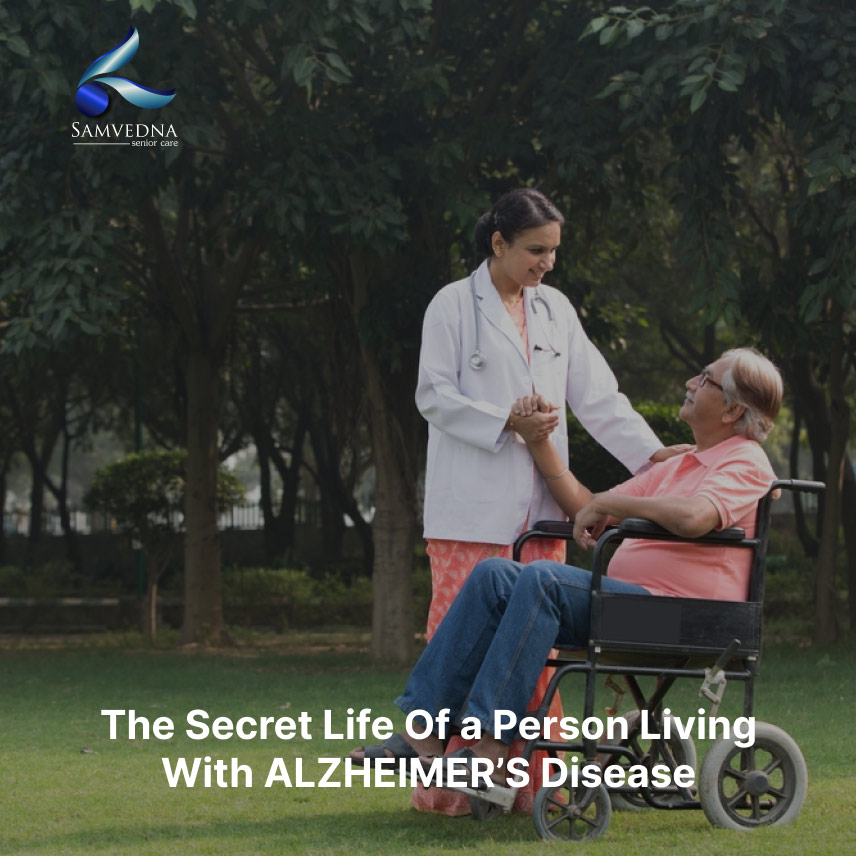Alzheimer’s disease (AD) is the most common type of dementia. Alzheimer’s disease typically manifests itself gradually, families and affected individuals may not acknowledge the disease until apparent deficits appear. Being diagnosed with Alzheimer’s disease can be a traumatic experience for both seniors along with their family and friends. Fear, as well as a lack of awareness and understanding about the disease, contribute to the stigma associated with dementia and other related illnesses. Often, this stigma results in jeopardizing the psycho-social well-being of persons diagnosed with Alzheimer’s disease.
DELAY IN DIAGNOSIS
A majority of research indicates that missed or delayed dementia diagnoses are quite common. Family members frequently believe that behavioural and cognitive changes are normal parts of aging and do not seek treatment until their health deteriorates profoundly. With help of the Samvedna Care MAP tool, one can easily take a self-assessment at home for self and family for early dementia diagnosis.
Affected individuals may delay or refuse treatment because they are unaware of the extent of their own impairment. While receiving a dementia diagnosis of Alzheimer’s disease can be difficult, getting reliable information and support can help you know what to expect and what to do next. Samvedna Care has highly recognized programs for caregiver enablement to take care of a person with Dementia.
Various psychological and physiological changes entail once a person is diagnosed with progressive neurodegenerative disease and may affect many of their body’s essential activities, such as balance, movement, talking, breathing, and heart functioning.
GRIEVING AND ACCEPTANCE
- Common reactions immediately after getting the diagnosis are shock and denial, frequently followed by depression, anxiety, and/or anger. Many people grieve about their predicament before adjusting to it. Some people may have difficulty dealing with these emotions.
- They may be concerned about the future, about periods of confusion and forgetfulness, and about the impact dementia has on those around them. Depression, anxiety, stress, and difficulty sleeping are examples of emotional and mental health issues.
- Those around the person will encounter their own feelings and emotions. It is critical that both the person with Alzheimer’s and those around them feel secure trying to express their emotions. Accepting the diagnosis is the first and most difficult step.
- A dementia diagnosis is extremely difficult to accept. However, it is preferable that those close to the affected person are aware of the situation, so that they can adjust to the condition, learn about dementia, and learn how to provide support.
SOCIAL ROLES AND DIGNITY
- A person’s social role in the family changes as dementia progresses. Dementia can make people feel insecure and lose faith in themselves and their abilities. They may feel out of control and lose faith in their own judgment. As a result of their diagnosis, they may also face internalized stigma, isolation, and social “demotion”.
- When a child or spouse takes over the responsibilities of the person having the illness, they may lose their autonomy. In turn, the affected individual may express frustration and anger, which itself is, regularly directed at the loved ones.
- The unpredictability of Alzheimer’s natural course contributes to the family’s role ambiguity. As the affected individual’s personality changes, some family members who live outside the home may withdraw from family interaction.
PLANNING FOR THE FUTURE
- A diagnosis of Alzheimer’s disease can leave the elderly feeling disconnected, isolated, or abandoned by others. Hence, having open talks and discussions with the family is crucial to envisage a support system. Coming to terms with the diagnosis, moving forward, and discovering new ways to live a positive and fulfilling life, could be the next steps.
- Making a plan for the future when the disease is still in its early stage, maybe empowering for the affected individuals. It also ensures that their decisions are honoured. This will encompass various treatment options available, legal and financial planning for the future, preparing advance directives and building a care team that can support the patient with the psychological and physiological issues that might follow after being diagnosed. Samvedna Care has highly specialized dementia care services for family members to help with acceptance, awareness and care for dementia. Our dementia care plan supports you and your loved ones in establishing a solid foundation and planning for the journey ahead by raising your awareness of dementia and organizing medical, physical, and emotional care to manage the symptoms.



